
The central mystery of our time is why, at a moment when the whole political and social system is out of control and in total chaos, no one seems able to imagine any alternative. The economic system is not delivering the good life it once promised, but is instead creating chaos and hardship for millions. Meanwhile, those in charge of the system are profiting massively from that chaos, feeding off the uncertainty. And the political class are in thrall to an economic theory that has become absurd and corrupted.
I’ve just made TraumaZone, a series of films about another time when that was happening. It was in Russia in the 1990s after communism collapsed. Those in charge began an experiment to create an extreme form of capitalism. I made it because I don’t think we in the west understand what the Russians went through: a cataclysm that tore apart the foundations of society.
The films are made using a unique source of material: thousands of hours of raw footage recorded by BBC crews in Russia during that time, much of it never seen before. What makes it so extraordinary is that it records the experiences of Russians at every level of society as their world fell apart: from inside the Kremlin to the frozen mining cities of the Arctic circle, from life in the tiny villages of the vast steppes to the strange wars fought in the mountains and forests of the Caucasus.
As I watched the footage I decided that I shouldn’t use my voice or paste music over it. The material was so strong that I didn’t want to intrude pointlessly, but rather let viewers simply experience what was happening, because it is was out of this – the anger, violence, desperation and overwhelming corruption – that Vladimir Putin emerged. But as I made the films, the growing chaos here in Britain made me see parallels. There are of course vast differences between our society and the Russia of 30 years ago, but the more you find out about the extreme economic experiment there, and what is happening here now with the present government, the more you see that they both share very similar roots that have nothing to do with either capitalism or communism.
The clue lies in the man who imposed the “shock therapy” experiment on Russia. Called Yegor Gaidar, he was at the heart of the communist establishment. His grandfather was the most famous writer of children’s books in the Soviet Union, and Gaidar had married the daughter of one of the Strugatsky brothers, science-fiction writers who wrote the novel the film Stalker was based on. This economist who would become acting prime minister set out to create a perfect capitalist system in Russia. He had to do it fast, he said, to stop communism from ever returning. Overnight, he removed all controls over prices, while the government gave up on any attempt to manage the system. The aim, said Gaidar, was to create a new zone of perfect freedom in which, despite initial pain, the system would find its own natural equilibrium.

But if you look closer, you will see that his plan had little to do with freedom. It was in fact an odd, machine-like vision of the world driven by pseudoscientific ideas. Gaidar believed that by unleashing “free market forces” on an extreme scale, they would act as “market stimuli” that would then automatically lead people into “rational” patterns of behaviour. In reality, it was a simplified engineering system where human beings would be reshaped, turned into the right kinds of beings to make the new system work. In that way, it was like a reverse image of the Soviet plan. It was still a way of controlling behaviour through levers, but just a different way.
And it didn’t work. It led to total chaos.
The present government in Britain under Liz Truss has just announced its own experiment with extreme capitalism. The roots of her idea lie with the famous Austrian-British economist Friedrich Hayek. Both the right and the left see him as the man who masterminded the return of the free market, what is called “neoliberalism”. But I think Hayek, who was a powerful influence on Gaidar, was actually far stranger than that.
Hayek believed that economics was the key to the future of the world because it would stop governments trying to imagine new kinds of societies. He wrote a book called The Road to Serfdom, saying that in the new age of the mass, it was impossible to impose a vision of the future on to millions of people without leading to horror – like fascism and communism had. Instead, Hayek had an epic vision in which millions of people would together create a stable social system through the signals they send each other. At the heart of that was the pricing system. Governments should pull back and not control prices – and instead allow a “spontaneous order” without central control. The people, not politicians, would create the new society together as “economic actors”.

Up to that point, economics had been important in government, but only as a tool to help manage the societies politicians wanted to build. But in 1979, when Margaret Thatcher came to power, she began an experiment that brought economic logic into the very heart of the political system. The problem was that it almost immediately went haywire. It not only created massive inflation but was one of the main reasons for the de-industrialisation of British society. As her senior advisers admitted, Thatcher very quickly gave up on the experiment and turned instead to the banks to lend people money. And a wave of cheap money and debt covered up the problems until the financial crash of 2008.
In reality, the grand ideas of Gaidar and Hayek had very little to do with ideas of the free market. They were actually rooted in old dreams born in the 19th century that science and rational systems could be used on a grand scale to replace politics, because that would avoid the human messiness and uncertainties that continually push politics off course. In fact, the system Gaidar set out to replace – the Soviet plan – was also rooted in those pseudo-scientific dreams. It had little to do with communism.
In the 1930s, in the Soviet Union under Stalin, the old ideology fell away and was replaced by a giant experiment. Human beings became simplified into components in a system that could be managed in a rational way with predictable outcomes. Those ideas also flourished in America in the 1930s. A mass movement called “technocracy” rose up. Hundreds of men and women, dressed “rationally” in grey outfits, travelled through the US calling for what they called a “Technate”, a new kind of society that would be run rationally by engineers. One of their leading members was Elon Musk’s grandfather.

But all these movements were really the product of a weird overreach of science attempting to grab and colonise the political realm. And in reality, those experiments always failed. Whether in the Soviet Union, or in 1980s Britain, or under Gaidar’s shock therapy, and now with Liz Truss, it never creates a rational system. It actually creates the opposite: a system that becomes increasingly unequal and open to exploitation by a small elite. And there are no political levers to stop them.
In Russia, the films show moments that capture the terrifying speed with which the chasm between rich and poor opened up. Thousands couldn’t even afford food or pay for heating while the health service collapsed around them. Bewildered shoppers are told “there are no potatoes in Moscow”, while the new elite restage elaborate 18th-century balls in old palaces outside St Petersburg.
We see the ruthless self-interest of managers and gangsters as they discover more and more ways to loot the failing state, with machines in the oligarchs’ “banks” endlessly counting millions of rouble notes before they are moved into offshore zones. And no one in the political system could stop them. At the heart of all this was an increasingly drunken president Yeltsin who sat in the Kremlin staring at the wall saying to his bodyguard: “They are stealing Russia.”

And in Britain, quantitative easing and the extreme rise in asset prices and property it brought about are as destructive to the lives of millions of ordinary people as were the oligarchs in Russia in the 1990s. The kind of freedom that this sort of technate offers is always very limited: people are just components in a system, free to do what they want, but only within the narrow logic of the iron cage of pseudoscientific economics. A world where they dance, but only in those chains.
At this time of economic chaos, it feels imperative to reassess what both the west and Russia actually went through in the past 50 years. Perhaps it was neither communism nor the free market that failed, but the Technate. We should clear away the pseudoscience of economics that has politicians trapped in a death grip – and look again at both capitalism and communism for the human values and aspirations they contain. And from that could come real alternative visions of the future.
• Russia 1985-1999 TraumaZone: What It Felt Like to Live Through the Collapse of Communism and Democracy is on iPlayer from 13 October







